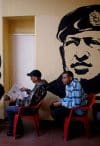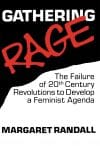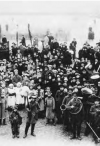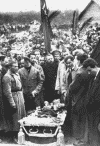Revolutions

Thoughts on the Transition between Modes of Production on the Occasion of the Marx Bicentennial
Revolution is still on the agenda for the global periphery. Restorations in the course of socialist transition are not irrevocable—and in the weak links of the center, breaks in the imperialist front are not inconceivable. | more…

The Manifesto‘s analysis of the capitalist crises that “put on its trial, each time more threateningly, the existence of the entire bourgeois society” remains central to any attempt to predict the events of the coming years. | more…

Teachings from the Global South for Revolutionaries in the Global North
We have entered a period of history fraught with danger but also rich with revolutionary potential. It is time to move beyond our illusions that electoral politics and reforms of the capitalist state can achieve the revolutionary changes that we all know are urgently needed. As we begin to reorient our struggles there are important lessons to be learned from the recent history of the global South. | more…

President Chávez, in line with Marx, identified revolutionary praxis as the key link between human development and practice: “We have to practice socialism…and this practice will create us, ourselves, it will change us; if not we won’t make it.” From this standpoint, the material product of activity is always accompanied by a second product—the human product. Since the human product has historically been neglected in socialist theories of transition, it is worth considering its significance. | more…

The Bolivarian Revolution in Venezuela has always been shaped by the dangers and demands of achieving socialism through democratic means. Only by reckoning with that complexity can we understand both Venezuela’s current crisis and its recent history. | more…

As the smoke clears from the collapse of revolutionary societies from Eurasia to Central America, analysts are searching for the crucial points of weakness that led to the failure of these “socialist experiments.” In Gathering Rage, writer, poet, and activist Margaret Randall describes how two of these revolutions, in Nicaragua and in Cuba, addressed or failed to address a feminist agenda.
Writing as both observer and participant, Randall vividly describes how, in each case, to varying degrees, and in different ways, women’s issues were gradually pushed aside. Combining anecdotes with analysis, she shows how distorted visions of liberation and shortcomings in practice left a legacy that

For this special issue, MR has invited some of the most profound left thinkers in the world to reflect on the legacy of revolutions and counterrevolutions around the world since 1917. Naturally, these authors do not all offer similar perspectives or come to the same conclusions. Nor should they—the historical issues are too complex and the human stakes are too high. | more…

If counterrevolution ultimately triumphed over the revolutionary waves of the twentieth century, how are we to understand this, and what does it mean for the future of world revolution? The answer requires a survey of the whole history of imperialist geopolitics over the last century. | more…

The October Revolution was the first such event in human history that was theoretically conceived and executed according to a plan. It is this theoretical comprehension of the underlying historical conjuncture that explains the revolution’s sweep and energy, the profound changes it wrought in the world, and the extent to which it threatened the very existence of capitalism. | more…

The fundamental humanist values of the Russian Revolution still capture the imagination. As an experience of history and a methodology for transforming the world into a community, the revolution’s legacy has persisted far beyond the failed experiment of state socialism itself. | more…

Post-revolutionary societies, in their efforts to combat counterrevolution, have always been confronted with their own contradictions, and with the persistent threat that an exploiting class could reemerge. Instead of the intended socialization and democratization, in many places what resulted was instead state ownership and stultifying bureaucratization of both the economy and the polity. | more…

For a century, the counterrevolutionary reaction to the events of October 1917 has arguably been the most determining ideological factor in Western politics. Today the victory of that counterrevolution is complete, but Western powers still need their inherited antithesis, in changing form, as self-justification. | more…











